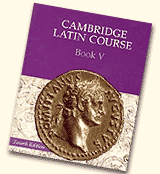The past comes to haunt Salvius who is accused of forgery - the forgery, no less, of King Cogidubnus' will! What should Salvius do? Ignore the charges and hope that his high status as a former consul sees him through, or prepare a defence? It's time to do as the Romans do - ask friends for advice.

We've reached the final Stage of the Cambridge Latin Course! While the Emperor Domitian will rule for a few more years until his assassination in AD 96, we draw to a close by going to court and bidding "vale" to many of the characters we've met in Rome - including the scheming Salvius, for whom it's Judgement Day!
The Stories
Salvius' situation gets bleaker! The Emperor's wife, Domitia, wants revenge for his involvement in her exile and the execution of her beloved Paris; and it's rumored that unsavoury evidence has been pulled from the springs of Aquae Sulis in Britain...
Salvius goes on trial in the Senate House, the Curia, where his accusers put the charges before the Emperor and assembled Senators. And, in a dramatic twist, a new witness steps forward...
Despair starts to grip Salvius - it's time for him to alter his will. And hope is not the only thing leaving him...
Will justice be served? Will the deaths of Cogidubnus and Paris be avenged? Will Myropnous, the dwarf, ever play his pipes again? The verdict is announced...
And finally... What have three goats and the Carthaginian Wars got in common? Not much - but tell that to the judge! We end with a short Latin satire in which Martial has a go at pretentious lawyers. Some things never change!
Practising the Language
Activities for vocabulary revision and language practice:
Test your Vocabulary is against the clock and can be set to all words in this stage, up to this stage, etc.
Word Endings exercises are based on the Practising the Language section in the Books, and follow this format. Click here for more information.
Word Endings activities are based on the Practising the Language section of each Stage, and all follow the same format. The user is given a sentence in English together with the same sentence in Latin, but with one or more endings to be chosen from a drop down list. In most exercises the endings omitted are restricted to one particular part of speech (noun, verb or adjective). For this type of exercise language information is provided. This can be called up by the user at any time by clicking on LANGUAGE INFO. But in some exercises, all noun, verb and adjective endings are omitted. For this more demanding exercise, LANGUAGE INFO provides only reference to the relevant pages of the Cambridge Latin Course.
Sorting Words asks you to sort words by meaning, case, etc.
Practising the Language exercises are digital versions of exercises in the Cambridge Latin Course textbooks.
Please note: the Cultural Background weblinks section has been removed.



